Jia Yueting cannot become Lei Jun
![]() 10/17 2024
10/17 2024
![]() 498
498
Written by Lu Qianying
Edited by Ma Jun
After a full decade in the United States, Jia Yueting has not given up on his dream of building cars.
Perhaps seeing Lei Jun leverage his personal IP to indirectly advance his car-making endeavors, Jia Yueting has also attempted to emulate Lei Jun by creating his own personal IP to attract attention.
Recently, he announced the establishment of a global IP commercialization company, 'Grow Up! Strivers', hoping to attract more attention to Faraday Future by portraying himself as a 'striver' through his personal IP.
However, unlike Lei Jun, Jia Yueting lacks a substantial fan base. Lei Jun's image as an 'internet celebrity entrepreneur' stems from long-term cultivation, whereas Jia Yueting's reputation has been severely damaged since the collapse of LeTV.

Despite his desire to follow Lei Jun's path as an internet celebrity, the lack of market trust makes this journey inherently more difficult for Jia Yueting.
Car manufacturing has also been a bumpy road for Jia Yueting.
Faraday Future (FF) was once seen as a competitor to Tesla, with the FF 91 model hailed as a masterpiece of luxury electric vehicles.
However, since 2017, FF's mass production plans have been repeatedly delayed. As of 2023, only a handful of vehicles have been delivered, far short of market expectations. Meanwhile, the company's financial situation has continued to deteriorate, with a loss of up to $157 million in the first half of 2023 against mere tens of thousands of dollars in revenue.
This significant funding gap further dims FF's future prospects.
Now, Jia Yueting may hope to attract capital market attention through his personal IP, helping FF address its funding shortfall. But compared to the days when he successfully raised funds through PowerPoint presentations, his stories now struggle to resonate.
The harsh reality is that Faraday Future's future remains uncertain unless production capacity is swiftly increased and stable deliveries are achieved.
The challenges of car manufacturing persist, making it difficult for Jia Yueting to emulate Lei Jun.
1. Should Jia Yueting learn from Lei Jun in creating his personal IP?
In recent years, entrepreneurs have gravitated towards cultivating celebrity personas, making personal IP development a trend.
Among the most popular entrepreneurs in today's Chinese internet landscape, Lei Jun stands out. By successfully portraying himself as a 'striver,' he has led Xiaomi's expansion from smartphones to home appliances and automobiles, significantly boosting sales of Xiaomi's electric vehicles this year.
Observing this model's success from across the ocean, Jia Yueting is attempting to replicate Lei Jun's approach, hoping to rise again through his personal IP.
In recent months, Jia Yueting has been active. In May, he posted a video on Weibo announcing his plan to commercialize his personal IP, earn money to repay debts, and continue his car-making endeavors. Since then, he has frequently updated his Weibo with personal videos showcasing his daily life and work dynamics.
Then, on October 9, Jia Yueting retweeted a post with the ID 'Grow Up! Strivers' on Weibo, titled 'Jia Yueting and Partners Establish IP Company "Grow Up! Strivers," Gifting FF 10% of Shares.'
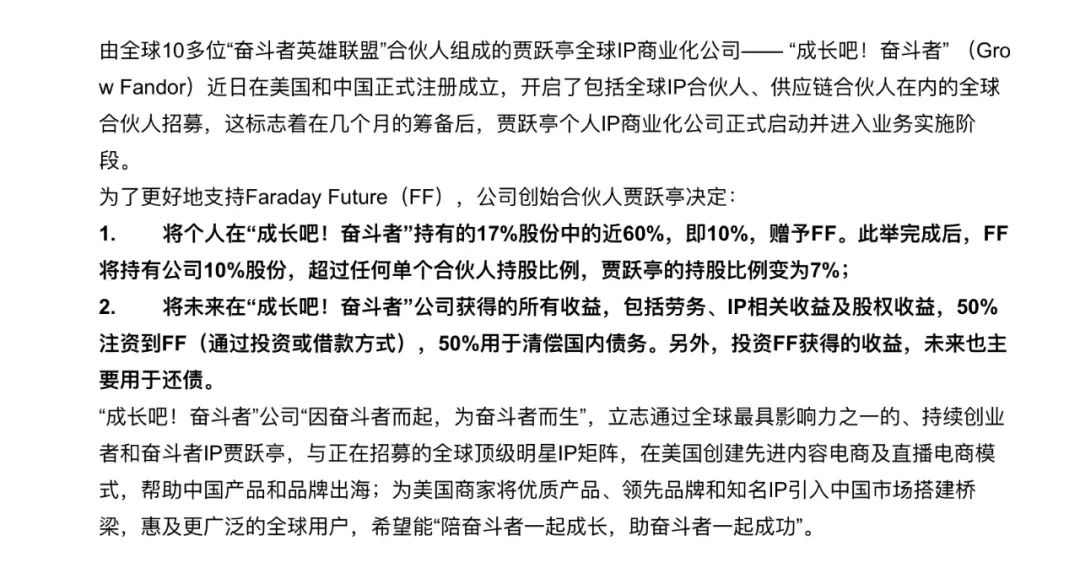
The article stated that Jia Yueting and his partners had founded the global IP commercialization company 'Grow Up! Strivers' (Grow Fandor), registered in both the US and China. Adopting a model of global IP and supply chain partners, the company aims to promote Jia Yueting's entrepreneurial story and 'striver' image globally, thereby helping his electric vehicle project, FF, overcome its funding difficulties.
In the days that followed, Jia Yueting released additional videos and posts, expressing his commitment to repaying debts and returning to China.
Concurrently, Jia Yueting attempted to establish a self-media account for live streaming and product promotion, but his live streaming journey has not been smooth.
As of October 16, the 'Grow Up! Strivers' Douyin account had only 14,000 followers. While some related videos garnered around 22,000 likes, they have since been deleted. Additionally, the account's product showcase once listed 199 items, which have now been removed.
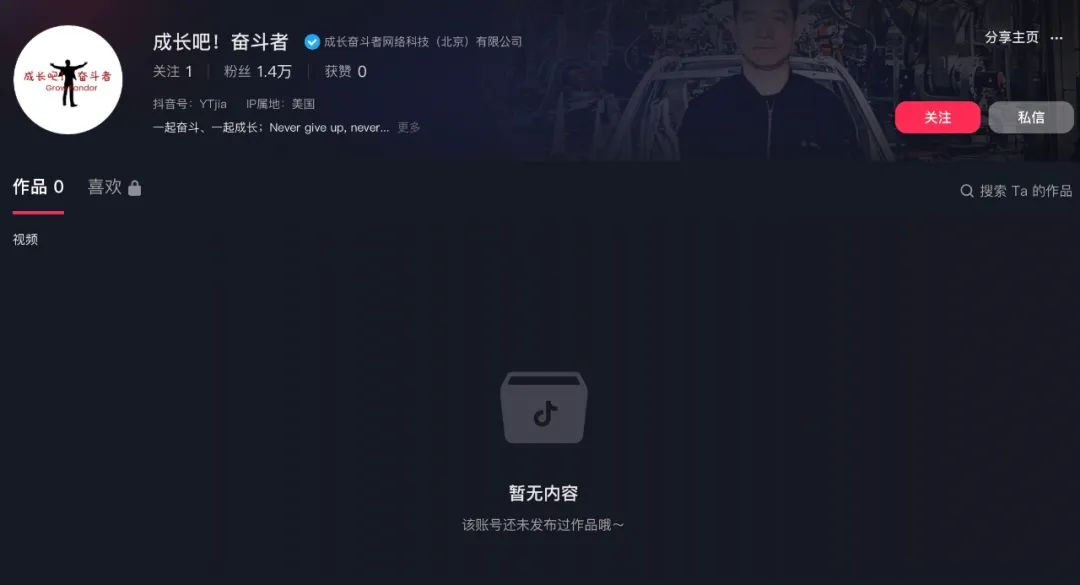
Jia Yueting may believe that developing his personal IP is a path to break Faraday Future's stalemate. Multiple factors underlie his accelerated push for personal IP development at this juncture.
Currently, Faraday Future faces a severe delisting crisis. In recent years, the company's share price has plunged below $1, and it has received two delisting warnings from Nasdaq due to consecutive trading days below the minimum requirement.
Beyond funding issues, Jia Yueting's personal debt problems also loom large. In 2020, he initiated personal bankruptcy reorganization, transferring some assets to a trust fund to repay creditors. However, doubts persist about his ability to truly overcome his debt crisis.
Thus, attracting funds through his personal IP has become a fast-track strategy for Jia Yueting.
His efforts are aimed at saving both the company and himself, but this path is inherently challenging.
2. Jia Yueting cannot become Lei Jun
Both Jia Yueting and Lei Jun are renowned figures in Chinese business circles.
Years ago, Jia Yueting's personal IP value and entrepreneurial image rivaled those of Lei Jun. However, over time, Jia Yueting's business path encountered difficulties, while Lei Jun continued to progress steadily. Their entrepreneurial trajectories gradually diverged.
Jia Yueting's entrepreneurial journey dates back to 2004, when he founded LeTV, initially focusing on video services. Rapidly expanding through a 'synergistic ecosystem' strategy, LeTV became a star in China's internet industry, with Jia Yueting venturing into television, mobile phones, sports, film production, and other sectors, aiming to build a cross-sectoral technology empire.
LeTV's meteoric rise made Jia Yueting a star in Chinese business circles, with his business empire seemingly encompassing everything. His capital market narratives garnered investor favor and attracted numerous supporters.
However, this expansion model also buried hidden dangers. LeTV's growth outpaced its capacity, gradually exposing capital chain issues. In 2016, news of LeTV's capital chain collapse emerged, leading to the company's downfall and plunging Jia Yueting into a credibility crisis. Despite his former capital market prowess, this collapse swiftly transformed him from a hero to a discredited figure, with the LeTV empire collapsing around him.
Undeterred by the LeTV crisis, Jia Yueting redirected his dreams to the global electric vehicle market, founding Faraday Future, hoping to rise anew through car manufacturing.
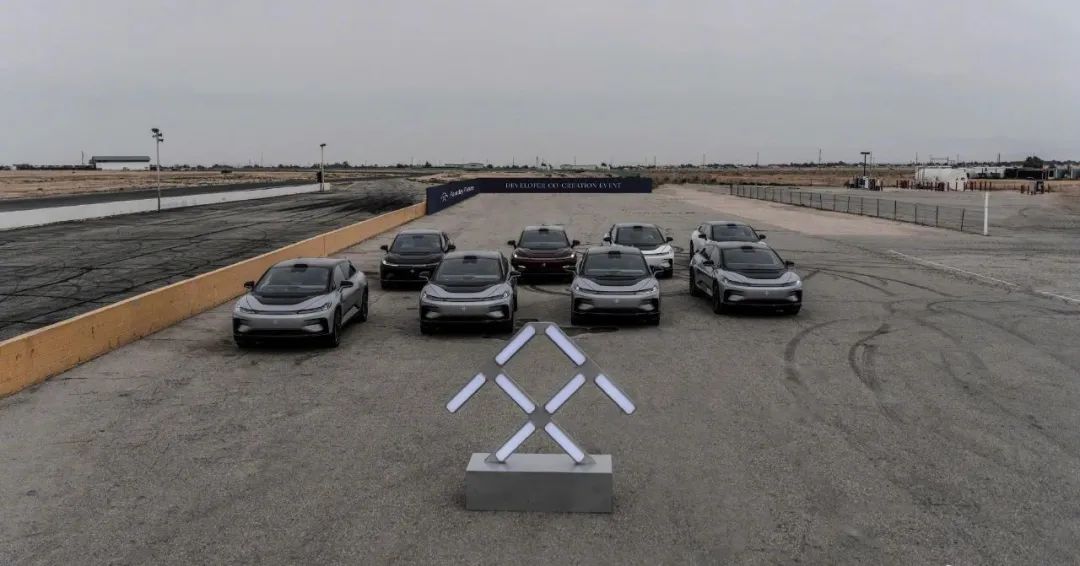
Since its inception, Faraday Future has weathered numerous crises.
In 2017, Jia Yueting unveiled the FF91, billing it as a Tesla competitor. However, with repeated delays in mass production, market confidence waned, exposing severe funding and management issues.
In 2018, Faraday Future secured a $2 billion investment from Evergrande, seen as crucial to saving the company. However, disagreements over fund utilization strained their partnership, ultimately leading to a fracture in cooperation and renewed financial distress for Faraday Future.
In 2021, Faraday Future successfully listed on Nasdaq through a SPAC model. Yet, post-listing, share prices plummeted, and by 2023, the company faced delisting risk as its share price dipped below $1.
Subsequently, on April 18, 2024, Nasdaq notified Faraday Future that it had not submitted its annual 10-K report for 2023, demanding a compliant remediation plan within 60 days. On April 24, Nasdaq issued another delisting notice, citing consecutive 10 trading days with closing prices below $0.10, deciding to delist the company's securities.
It wasn't until September that Faraday Future announced it had regained Nasdaq compliance. That same month, the company also announced a $30 million funding commitment from investors in the Middle East, the US, and Asia, though the timing of disbursement remains uncertain.
In essence, Jia Yueting's current focus on personal IP development is more about ensuring Faraday Future's survival.
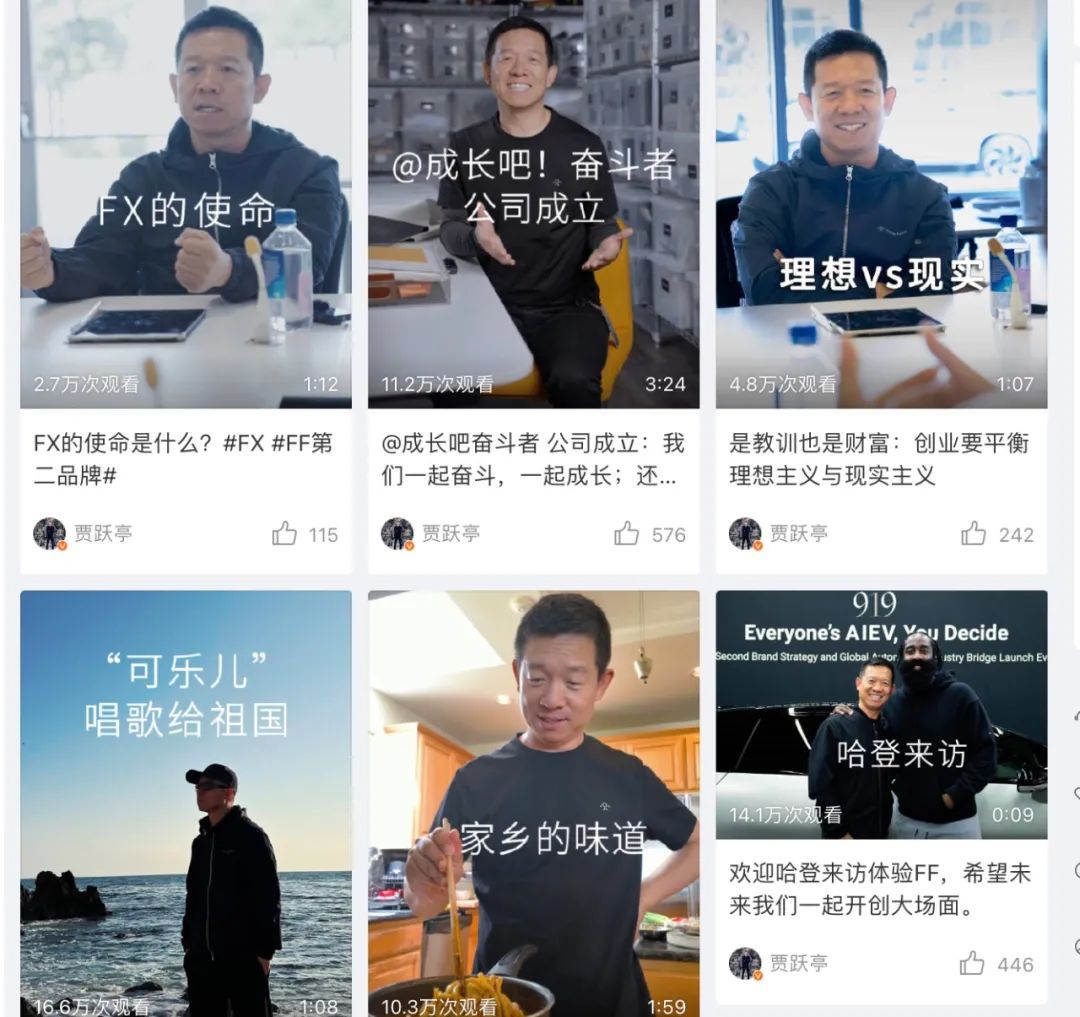
However, Jia Yueting struggles to replicate Lei Jun's IP methodology.
Fundamentally, Lei Jun's 'persona' is relatively stable. Since founding Xiaomi, he has gradually expanded from smartphones to smart hardware, home appliances, and automobiles through the Xiaomi ecosystem.
In recent years, through frequent live streams and speeches, Lei Jun has continually shared stories of 'turning adversity into victory' and 'grassroots entrepreneurship,' emerging as Xiaomi's foremost image ambassador. His inspiring stories complement Xiaomi's products, significantly boosting sales of Xiaomi electric vehicles.
While Jia Yueting amassed supporters through LeTV in his early years, his base dwindled after LeTV's collapse and car manufacturing setbacks.
The fundamental difference between Lei Jun and Jia Yueting lies in their differing foundations of public trust. The lack of trust in Jia Yueting makes it difficult for him to gain sufficient support, even as he attempts to cultivate a 'striver' image.
3. The key lies in manufacturing and selling good cars
Jia Yueting's dream of car manufacturing has spanned a decade, yet Faraday Future's progress remains unsatisfactory.
From LeTV to Faraday Future, Jia Yueting has been a charismatic storyteller in the capital market. Initially, he successfully attracted massive capital through PowerPoint presentations and passionate speeches, positioning Faraday Future as a future electric vehicle brand rivaling Tesla.
However, no matter how compelling the story, failure to deliver on products ultimately exposes the truth.
Since its inception, Faraday Future has delivered only 14 vehicles, two of which were ordered by Jia Yueting himself and FF employees.
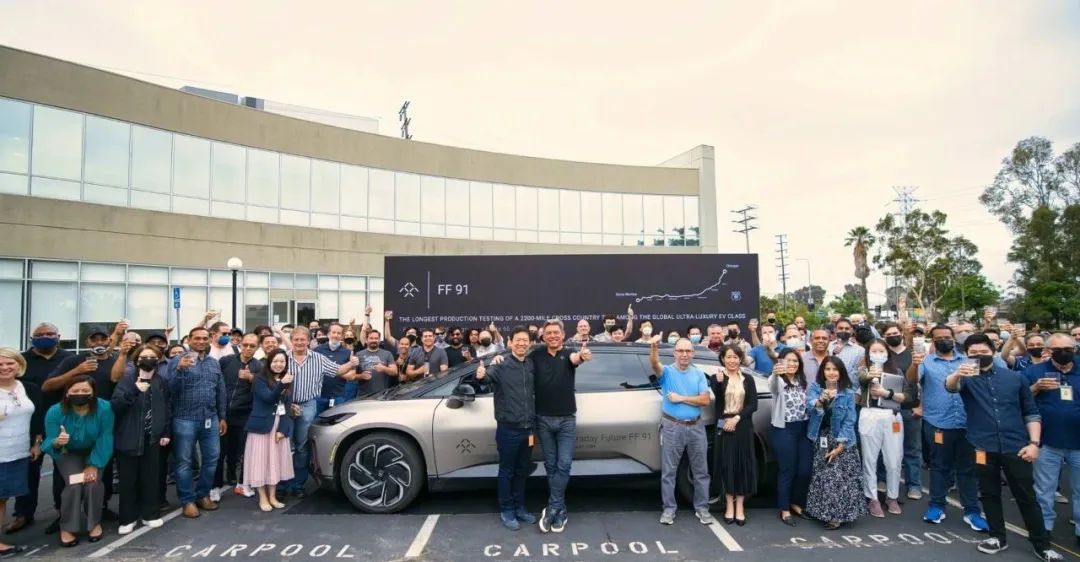
Yet, even with such low delivery numbers, the company's safety record is unconvincing. In March 2024, Faraday Future recalled all 11 previously delivered FF 91 vehicles due to faulty airbag warning lights. The issue could prevent the airbag fault warning light from illuminating upon detecting a system fault, potentially increasing the risk of injury in a collision.
To salvage the market, on September 20, Jia Yueting announced the launch of Faraday X, a more affordable electric vehicle brand. Positioned as the 'Toyota' of the smart electric vehicle market, Faraday X aims to enter the extended-range hybrid market. With two models planned, the FX5 is expected to retail for $20,000-$30,000, while the FX6 targets the $30,000-$50,000 range. The first model is slated for release in 2025.
Even with Faraday Future's more affordable offerings, doubts persist about its production and delivery capabilities. The company's second-quarter 2024 financial report revealed total assets of $457.9 million, liabilities of $309.2 million, and net assets of just $148.7 million (approximately RMB 1.062 billion). Additionally, cash available for operating activities dwindled to just $29.1 million (RMB 208 million), a sharp decline from the previous year.

Jia Yueting's car manufacturing dream is hampered by insufficient production capacity and funding shortages. Faraday Future has repeatedly halted production due to funding issues, and despite Jia Yueting's efforts to inject funds through personal IP projects and capital market maneuvers, the company struggles to escape its financial quagmire.
Moreover, Faraday Future faces a crisis of trust from investors and the market. Its inability to consistently produce and deliver vehicles has eroded public patience with its products and business model. While Jia Yueting has pledged to invest part of his personal earnings in Faraday Future through his IP commercialization project, this is but a drop in the ocean for addressing the massive funding gap.
For Faraday Future, the pressing issue is not how Jia Yueting can earn through his personal IP but how to swiftly manufacture and mass-produce good cars. No matter how compelling the IP story, it cannot replace the tangible impact of delivering quality products.
(Featured image sourced from Jia Yueting's Weibo account.)






